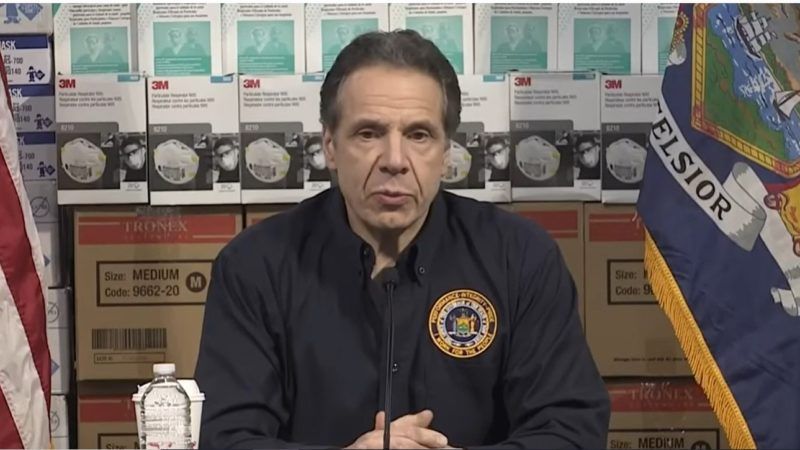Only Social Darwinians Worry About the Harm Caused by COVID-19 Lockdowns, Andrew Cuomo Says
The point of shutting down the "nonessential" economy, New York's governor explains, is to "save lives, period, whatever it costs."

Anyone who was looking for some assurance that politicians are giving appropriate weight to the potentially devastating economic impact of aggressive COVID-19 control measures will not find it in New York Gov. Andrew Cuomo's comments at his press conference today. "We're not going to put a dollar figure on human life," said Cuomo (D), who last Friday announced that "we're all in quarantine now" while ordering all "nonessential" businesses to close. The goal, he explained, is to "save lives, period, whatever it costs."
In a world of finite resources, where government agencies routinely and appropriately weigh the cost of potentially lifesaving regulations, that attitude is utterly irrational. Worse, Cuomo portrayed concerns about the millions of Americans who have been deprived of their livelihoods by lockdowns like his as cruel indifference to the fate of Americans who are especially vulnerable to COVID-19 because of their age or pre-existing medical conditions.
"My mother is not expendable, and your mother is not expendable, and our brothers and sisters are not expendable," Cuomo said when asked about "conservatives" who have noted the heavy burdens imposed by sweeping restrictions on movement, business operations, and work. "And we're not going to accept a premise that human life is disposable."
Here is what lockdown skeptics are really saying, according to Cuomo: "We'll just sacrifice old people; they're old people anyway. And the old get left behind….We're going to move on, and if you can't keep up, well, you just fall by the wayside of life." He described their philosophy as "some modern, Darwinian theory of natural selection."
That interpretation is not just uncharitable; it is cruel in its own way, treating the human costs of shutting down the "nonessential" economy, which fall disproportionately on people of modest means, as a minor consideration that a civilized society must overlook in the name of protecting the vulnerable. Furthermore, that way of framing the issue excludes the possibility that there might be more carefully targeted ways to protect the people who face the greatest risk from the epidemic without massive economic disruption that hurts millions of innocent people.
Regarding his order "mandating that 100% of the workforce must stay home, excluding essential services," Cuomo emphasized that "it is about the vulnerable," who he estimated represent "only 1 percent or 2 percent of the population." They are the people who are most likely to die from COVID-19 because "they are older, they have compromised immune systems, they are HIV positive, or they have emphysema, or they have an underlying heart condition, or they have bad asthma, or they're recovering from cancer."
David Katz, founding director of the Yale-Griffin Prevention Research Center, argues that such people could be protected by a "more surgical" strategy at a much lower cost to the general population. "I am deeply concerned that the social, economic and public health consequences of this near total meltdown of normal life—schools and businesses closed, gatherings banned—will be long lasting and calamitous, possibly graver than the direct toll of the virus itself," Katz writes in The New York Times. "We could achieve the crucial goals of social distancing—saving lives and not overwhelming our medical system—by preferentially protecting the medically frail and those over age 60, and in particular those over 70 and 80, from exposure."
In Cuomo's mind, however, anything short of a general "quarantine" would be reckless. "I believe you can have an intelligent, refined public health strategy," he said today. "You can have an economic startup strategy that is consistent with the public health strategy….You can do both, but not in a clumsy, ham-handed way."
If critics like Katz are right, politicians like Cuomo are the ones who are acting "in a clumsy, ham-handed way" by banning economic activity instead of considering narrower, less damaging alternatives. Cuomo said he might let people who develop immunity after being exposed to the virus "go back to work." But that assumes a capacity for wide testing that does not currently exist, and the immunity Cuomo has in mind will not be very common if his measures work as intended by preventing transmission of the virus.
In the absence of lockdowns, Katz says, "society as a whole could develop natural herd immunity to the virus. The vast majority of people would develop mild coronavirus infections, while medical resources could focus on those who fell critically ill. Once the wider population had been exposed and, if infected, had recovered and gained natural immunity, the risk to the most vulnerable would fall dramatically." Cuomo is simultaneously counting on such immunity and doing everything in his power to prevent it.
Cuomo also said "you can have younger people go back to work," suggesting that, given their very low risk of dying from COVID-19, they might not have to develop immunity or test negative for the virus before being allowed to earn a living again. But when that might happen seems to be completely up in the air.
The correct response to COVID-19, Cuomo said, is "smart," "complicated," and "sophisticated." But not to worry: "That's what government is supposed to do, right?"
